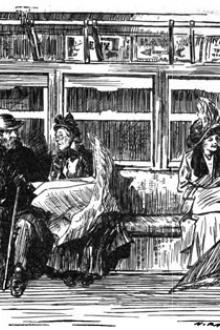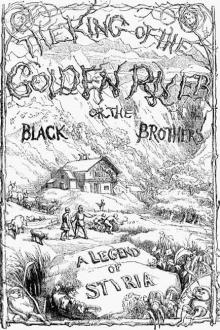Genre Short Story. Page - 6

u came out, which made you very careful how you left it about afterwards because people were turned so red and uncomfortable by mostly guessing it was somebody else quite different, and there was once a certain person that had put his money in a hop business that came in one morning to pay his rent and his respects being the second floor that would have taken it down from its hook and put it in his breast-pocket--you understand my dear--for the L, he says of the original--only there was no mellowness in HIS voice and I wouldn't let him, but his opinion of it you may gather from his saying to it "Speak to me Emma!" which was far from a rational observation no doubt but still a tribute to its being a likeness, and I think myself it WAS like me when I was young and wore that sort of stays.
But it was about the Lodgings that I was intending to hold forth and certainly I ought to know something of the business having been in it so long, for it was early in the second year of my married life that I lost my p

e of this same House.
As I say, I went and saw for myself. The lodging was perfect.That, I was sure it would be; because Trottle is the best judge ofcomfort I know. The empty house was an eyesore; and that I was sureit would be too, for the same reason. However, setting the onething against the other, the good against the bad, the lodging verysoon got the victory over the House. My lawyer, Mr. Squares, ofCrown Office Row; Temple, drew up an agreement; which his young manjabbered over so dreadfully when he read it to me, that I didn'tunderstand one word of it except my own name; and hardly that, and Isigned it, and the other party signed it, and, in three weeks' time,I moved my old bones, bag and baggage, up to London.
For the first month or so, I arranged to leave Trottle at the Wells.I made this arrangement, not only because there was a good deal totake care of in the way of my school-children and pensioners, andalso of a new stove in the hall to air the house in my absence,which appe

rd and dusted with his own hands every morning before varnishing his boots) I notice him as full of thought and care as full can be and frowning in a fearful manner, but indeed the Major does nothing by halves as witness his great delight in going out surveying with Jemmy when he has Jemmy to go with, carrying a chain and a measuring-tape and driving I don't know what improvements right through Westminster Abbey and fully believed in the streets to be knocking everything upside down by Act of Parliament. As please Heaven will come to pass when Jemmy takes to that as a profession!
Mentioning my poor Lirriper brings into my head his own youngest brother the Doctor though Doctor of what I am sure it would be hard to say unless Liquor, for neither Physic nor Music nor yet Law does Joshua Lirriper know a morsel of except continually being summoned to the County Court and having orders made upon him which he runs away from, and once was taken in the passage of this very house with an umbrella up and the Majo

the go-horse was in position, and thus steadied it admirably with this hint taken direct from the workmanship of the Great Carpenter.
There came a day when the horse was finished and the last coat of paint had dried smooth and hard. That evening, when Nebby came running to meet Zacchy, he was aware of his Grandfather's voice in the dusk, shouting:--"Whoa, Mare! Whoa, Mare!" followed immediately by the cracking of a whip.
Nebby shrilled out a call, and raced on, mad with excitement, towards the noise. He knew instantly that at last Granfer had managed to catch one of the wily Sea-Horses. Presumably the creature was somewhat intractable; for when Nebby arrived, he found the burly form of Granfer straining back tremendously upon stout reins, which Nebby saw vaguely in the dusk were attached to a squat, black monster:--
"Whoa, Mare!" roared Granfer, and lashed the air furiously with his whip. Nebby shrieked delight, and ran round and round, whilst Granfer struggled with the animal.
"H

r best to steal her credit. She'll do just as much for Miss Hinch--you may take it from me!"
"But how's she going to make the capture, gentlemen?" cried the young fellow, getting his chance at last. "That's the point my wife and I've been discussing. Assuming that she succeeds in spotting this woman-devil, what will she do? Now--"
"Do, sir! Yell for the police!" burst from the old gentleman at the door.
"And have Miss Hinch shoot her--and then herself, too? Wouldn't she have to --"
"Grand Central!" cried the guard for the second time; and the young fellow broke off reluctantly to find his pretty wife towing him strongly toward the door.
"Hope she nabs her soon, anyway," he called back to the clergyman over his shoulder. "The thing's getting on my nerves. One of these kindergarten reward-chasers· followed my wife for five blocks the other day, just because she's got a pointed chin, and I don't know what might have happened if I hadn't come along and--"
Doors rol

rtainly, sir. The page is off duty. He sees to orders in the lounge, but I'll attend to you myself."
"What a hotel!" thought the murderer, solitary in the chilly lounge, and gave a glance down the long passage. "Is the whole place run by the hall-porter? But of course it's the dead season."
Was it conceivable that nobody had heard the sound of the shot?
Harder had a strong impulse to run away. But no! To do so would be highly dangerous. He restrained himself.
"How much?" he asked of the hall-porter, who had arrived with a surprising quickness, tray in hand and glass on tray.
"A shilling, sir."
The murderer gave him eighteenpence, and drank off the cocktail.
"Thank you very much, sir." The hall-porter took the glass.
"See here!" said the murderer. "I'll look in again. I've got one or two little errands to do."
And he went, slowly, into the obscurity of the Marine Parade.
IV
Lomax Harder leant over the left arm of the sea-wall of

ling-pin no sooner touched the cap, than it flew out of Schwartz's hand, spinning like a straw in a high wind, and fell into the corner at the further end of the room.
"Who are you, sir?" demanded Schwartz, turning upon him.
"What's your business?" snarled Hans.
"I'm a poor old man, sir," the little gentleman began very modestly, "and I saw your fire through the window, and begged shelter for a quarter of an hour."
"Have the goodness to walk out again, then," said Schwartz. "We've quite enough water in our kitchen, without making it a drying house."
"It is a cold day to turn an old man out in, sir; look at my grey hairs." They hung down to his shoulders, as I told you before.
"Ay!" said Hans, "there are enough of them to keep you warm. Walk!"
"I'm very, very hungry, sir; couldn't you spare me a bit of bread before I go?"
"Bread, indeed!" said Schwartz; "do you suppose we've nothing to do with our bread, but to give it to such red-nosed fellows as you?"

the murder was not lacking.
My narrative in "The Night of Hate" is admittedly a purely theoretical account of the crime. But it is closely based upon all the known facts of incidence and of character; and if there is nothing in the surviving records that will absolutely support it, neither is there anything that can absolutely refute it.
In "The Night of Masquerade" I am guilty of quite arbitrarily discovering a reason to explain the mystery of Baron Bjelke's sudden change from the devoted friend and servant of Gustavus III of Sweden into his most bitter enemy. That speculation is quite indefensible, although affording a possible explanation of that mystery. In the case of "The Night of Kirk o' Field," on the other hand, I do not think any apology is necessary for my reconstruction of the precise manner in which Darnley met his death. The event has long been looked upon as one of the mysteries of history - the mystery lying in the fact that whilst the house at Kirk o' Field was destroyed by an e

anding his dissipation, Bottle-nosed Ned was a generalfavourite; and the authorities of Mudfog, remembering his numerousservices to the population, allowed him in return to get drunk inhis own way, without the fear of stocks, fine, or imprisonment. Hehad a general licence, and he showed his sense of the compliment bymaking the most of it.
We have been thus particular in describing the character andavocations of Bottle-nosed Ned, because it enables us to introducea fact politely, without hauling it into the reader's presence withindecent haste by the head and shoulders, and brings us verynaturally to relate, that on the very same evening on which Mr.Nicholas Tulrumble and family returned to Mudfog, Mr. Tulrumble'snew secretary, just imported from London, with a pale face andlight whiskers, thrust his head down to the very bottom of hisneckcloth-tie, in at the tap-room door of the Lighterman's Arms,and inquiring whether one Ned Twigger was luxuriating within,announced himself as the bearer of

ad formerly held in his affections, and cease from a cruelty that would destroy her. "For I may die," wrote the hapless girl, "but marry another--never!" That single word, indeed, had sufficed to betray her secret, had it not been already discovered; as it was, it gave increased fury to Sir Peter, as his sister triumphantly pointed it out to him, for it need hardly be said that while the ink of the address was yet wet, and the seal still warm, Rosina's letter was carried to this lady. The culprit was summoned before them; what ensued none could tell; for their own sakes the cruel pair tried to palliate their part. Voices were high, and the soft murmur of Rosina's tone was lost in the howling of Sir Peter and the snarling of his sister. "Out of doors you shall go," roared the old man; "under my roof you shall not spend another night." And the words "infamous seductress," and worse, such as had never met the poor girl's ear before, were caught by listening servants; and to each angry speech of the baronet, Mrs.